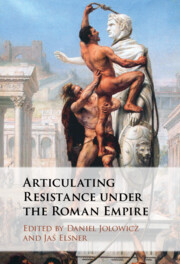Book contents
- Articulating Resistance under the Roman Empire
- Articulating Resistance under the Roman Empire
- Copyright page
- Contents
- Contributors
- Acknowledgements
- Abbreviations
- Introduction Articulating Resistance
- Part I Language and Identity
- Part II Genres of Literary Resistance
- Chapter 2 Courtroom Rhetoric in Imperial and Late Antique Philosophical Dialogues
- Chapter 3 Greek Declamation and the Art of Resistance
- Chapter 4 Plutarch’s Parallelism and Resistance
- Chapter 5 A Glitch in the Matrix
- Part III Identity Negotiation
- Part IV Religion and Resistance
- References
- Index
Chapter 4 - Plutarch’s Parallelism and Resistance
from Part II - Genres of Literary Resistance
Published online by Cambridge University Press: 23 December 2022
- Articulating Resistance under the Roman Empire
- Articulating Resistance under the Roman Empire
- Copyright page
- Contents
- Contributors
- Acknowledgements
- Abbreviations
- Introduction Articulating Resistance
- Part I Language and Identity
- Part II Genres of Literary Resistance
- Chapter 2 Courtroom Rhetoric in Imperial and Late Antique Philosophical Dialogues
- Chapter 3 Greek Declamation and the Art of Resistance
- Chapter 4 Plutarch’s Parallelism and Resistance
- Chapter 5 A Glitch in the Matrix
- Part III Identity Negotiation
- Part IV Religion and Resistance
- References
- Index
Summary
Plutarch’s parallel structure of the Lives, pitting a Greek protagonist against a Roman hero, offers a fascinating array of interpretative possibilities where cultural and political resistance to Rome and Roman imperialism are two of its more interesting manifestations. This chapter suggests that Plutarch’s text, encoded with devices of figured speech (e.g. allegory, irony and innuendo), was meant to be read and understood by two distinct audiences simultaneously: a Greek readership and a Roman one. Thus, on one hand, to his Roman readers Plutarch can implicitly present the flaws of historical Greeks, which may come out through the overarching comparison, and which his typical Hellenocentric addressees might miss. On the other hand, the reading and circulation of Plutarch’s text would also constitute a sophisticated form of resistance to the contemporary imperial environment. The text therefore contains non-conformist elements which Roman readers completely overlooked. Two such subversive elements directed against Rome are discussed: (a) cultural resistance, with the employment of cross-cultural irony to propose the mismatch of Greek paideia in (barbaric) Rome; (b) political resistance through a subtle reading of the past, in particular the grafting of the Greco-Persian Wars onto the imperial reality and through a sophisticated comment on one instance of Greek active opposition to Rome.
Keywords
- Type
- Chapter
- Information
- Articulating Resistance under the Roman Empire , pp. 89 - 111Publisher: Cambridge University PressPrint publication year: 2023

